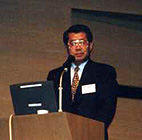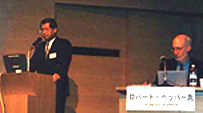WWVi International Symposium on Communication and Broadcasting in the Age of Internet 2001
Date: February 26, 2001
Place: Tsuda Hall in Tokyo
Hosted by World Wide Vision Initiative
Supported by GLOCOM
Keynote speech:
Dr. Hajime ONIKI, (Professor, Osaka-Gakuin University)
Who Owns the Spectrum in Japan?
 I am here today to represent our Research Group on Public Policy for Telecommunications and Broadcasting, which announced on February 1, 2001, a policy proposal for improving the administration of radio spectrum resources in Japan. I am here today to represent our Research Group on Public Policy for Telecommunications and Broadcasting, which announced on February 1, 2001, a policy proposal for improving the administration of radio spectrum resources in Japan.
First, I would like to present a summary of our proposal. In December 2000, the IT (information technology) Strategy Council of the Japanese government made an announcement on various IT policies, one of which was the rapid deployment of wireless broadband access to the Internet. We have pointed out, however, that performance in the use of radio spectrum resources in Japan is quite unsatisfactory, because the administration system, which was created at an earlier time when the shortage of radio spectrum was not so significant as it is today, has become obsolete. The Japanese government, following the old system, is still assigning radio spectrum bands mainly by discretion. Consequently, the use of radio spectrum remains inefficient, and the procedure for spectrum assignment is not transparent.
The demand for radio spectrum will be increased significantly in the future as technology for spectrum use is advanced. Therefore, if the current state of the use and the administration of radio spectrum remains unchanged, there likely will be impediments to the development of new technology and the use of new services. In view of the prolonged delay in the use of IT in Japan, the administration system for radio spectrum must be reformed quickly.
1. Introduce auctions in the allocation of spectrum resources:
In general, efficient allocation of spectrum resources can be achieved through fair competition by giving equal opportunities to incumbents and new entrants in access to the use of spectrum resources. We therefore propose that new licenses for the use of spectrum be provided by means of auctions. The benefit of auctions far exceeds its shortcomings, because auctions can choose providers and services that will give maximum benefit to users.
2. Promote relocation of incumbents:
Currently in Japan, some portions of spectrum resources are being used very efficiently while other portions are being used very inefficiently. This is a consequence of the insufficient execution of relocation of spectrum users by the government. Good spectrum resources have become extremely scarce. Thus, relocation is the only way to accommodate the demand for spectrum resources that will arise in the course of developing Japan's IT society.
3. Disclose information on the use of spectrum:
Information disclosure of the use of spectrum by the government is a prerequisite for achieving its efficient use and also for promoting research and development on new spectrum use. The government should make public all information concerning the current use of every band of spectrum, except for security purpose uses. Information to be disclosed should include by whom, for what purposes, to what extent, and under what specifications a band of spectrum is being used.
 As for auctions, we need to deal with problems such as auction winners' excessively strong property rights on spectrum. I would like to propose a lease auction system, where spectrum license auctions are conducted not only at the time of initial issuance of licenses, but also at the time of their renewal. After the license period of five or ten years ends, incumbents must apply for continued use of their licenses by means of auctions, competing with potential newcomers. The benefit of this lease auction system is quite evident: it uses market forces in free competition. Also, we can keep flexibility of allocating spectrum resources for various purposes. In addition, lease auctions can help lower bid prices, because what is determined by lease auctions will be lease prices, prices of using spectrum for five years or ten years only, as compared to "stock" auctions which tend to bid up spectrum prices more directly. As for auctions, we need to deal with problems such as auction winners' excessively strong property rights on spectrum. I would like to propose a lease auction system, where spectrum license auctions are conducted not only at the time of initial issuance of licenses, but also at the time of their renewal. After the license period of five or ten years ends, incumbents must apply for continued use of their licenses by means of auctions, competing with potential newcomers. The benefit of this lease auction system is quite evident: it uses market forces in free competition. Also, we can keep flexibility of allocating spectrum resources for various purposes. In addition, lease auctions can help lower bid prices, because what is determined by lease auctions will be lease prices, prices of using spectrum for five years or ten years only, as compared to "stock" auctions which tend to bid up spectrum prices more directly.
But, of course, such a lease auction system has its own shortcomings. The most serious difficulty is the kind of risk arising from possible discontinuation of the use of spectrum by losing the auction for the next-period use of the spectrum or by termination of spectrum allocation by the government. For this reason this system, if implemented without any modification, would certainly discourage fixed investments for using spectrum.
I would, therefore, like to mention a number of possible modifications to decrease, if not eliminate, the degree of the problems associated with the lease auction system. I call the description below a "modified lease auction" system:
1) Timing of auctions: Auctions should be conducted several years ahead of the start of using the spectrum so that incumbents can prepare for not being able to continue using spectrum for the next license period.
2) Discounts in favor of incumbents: Some discounts on auction payments should be given to incumbents, where the discount rates are to be carefully determined by the government from a social perspective.
3) Insurance against termination: Insurance should be provided to spectrum users against possible termination of spectrum allocation by the government. Such insurance could be offered by the government or private parties, where insurance premiums are to be set by spectrum users themselves and insurance fee rates are to be determined by the government.
Hopefully, these modifications will lead to a better allocation of spectrum resources for the advancement of the IT revolution in Japan.
| 




